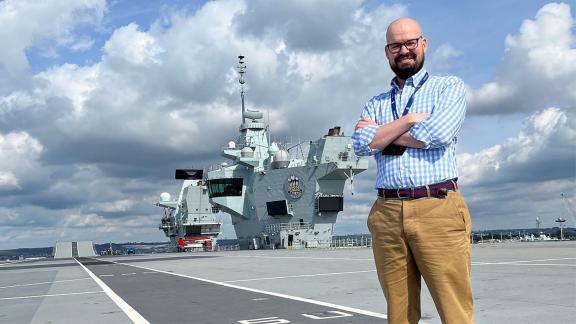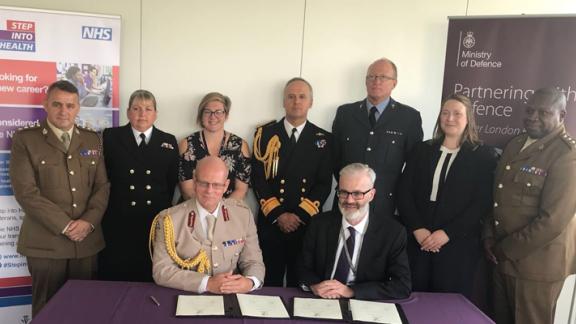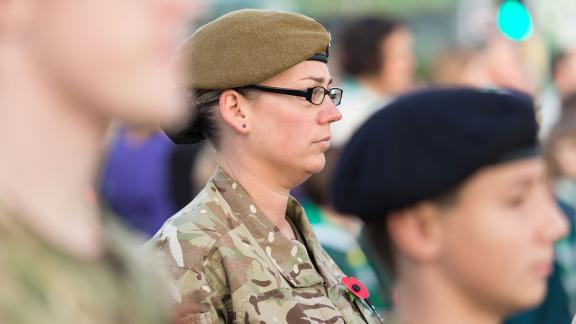How Reservists and their military leadership skills are valued by HNY ICB

I currently work within NHS Humber and North Yorkshire ICB (HNY ICB). My role is Senior Manager, Cultural Transformation and Armed Forces Lead (formerly part of the Best Place to Work Team). Since starting here last year, I have been working to ensure initiatives and policies have been put in place to support Reservist and Armed Forces Community members, whether employees or service users.
The ICB signed the Armed Forces Covenant on 6 October 2023 and was awarded Employer Recognition Scheme Bronze on 30 October 2023. The organisation recognises the importance of my work, not just as a commissioned officer in the RAF Reserves, but also my other role with the RAF Air Cadets, where I command a unit of 40 young adults and ten members of adult staff.
HNY ICB's special leave policy is very generous. They award five days of paid special leave for both reservists and cadet forces adult volunteers (CFAV) but also offer additional unpaid leave beyond that. This has enabled me to complete a mandatory squadron commanders’ course with the RAF Air Cadets and a period of annual continuous service (ACS) with the RAF Reserves.
It means the world to me to know that my employer is not only supportive of my work with the Armed Forces community but is actively committed to supporting me to deliver valuable output.
My focus has been to establish a culture of advocacy. I have worked to raise awareness and understanding of the Armed Forces Covenant, provided encouragement to take and de-mystify the initial steps, and provide examples of model policies to reduce the administrative burden. The impact has been increased buy-in and uptake. We attend various Armed Forces network calls, share ideas with other organisations and I also presented at the NHS Employers Armed Forces conference.
My role here is coming to an end but the future aspiration is that the ICB will continue to reach out to organisations in the wider system, to encourage and support them to sign the Armed Forces Covenant and work through the ERS awards, so that no matter where a Reservist goes within the ICS, they receive the same level of support.
I joined the Royal Air Force Reserves in 2010 as a commissioned officer. I’ve loved the intensity of operational deployments and have mobilised six times. I was inspired to join the Royal Air Force Reserves because I wanted a variety of unique experiences and the opportunity to work alongside diverse but likeminded people.
During my officer training we did leader-specified tasks where we were given a brief and had to take control of the situation. We also did leaderless tasks, where the group had to work together to achieve the goal, but no leader was designated. These tasks taught us to pitch-in, as well as the art of negotiation. The confidence to put ideas forward but also to actively listen to those of others was paramount.
My military experiences have helped me to bring many transferable skills to my civilian roles within the NHS because they have developed my capability to think strategically and flexibly and find solutions under pressure.
They’ve developed my ability to evaluate the strengths of my team members and use them to best effect to achieve the team’s goals. I think military training certainly invokes a ‘can-do’ attitude, as well as tenacity and determination.
I’ve had a few opportunities to carry out overseas adventurous training with the Reserves. Adventurous training provides the space to learn how to support and encourage each other whilst carrying out activities that may be out of people’s comfort zones. It’s a great confidence booster and makes people more resilient while developing soft skills.
I have deployed to several locations including Afghanistan, Cyprus, and Europe.
The military trains you to operate and think effectively in VUCA (volatile, uncertain, complex, and ambiguous) scenarios which is vital on operations but also relatable to certain situations in NHS roles.
By having that experience, when you're thrown in the deep end and there are multiple conflicting priorities, you’re able to decide where to focus the efforts whilst staying calm under pressure. Some of these situations have required compassion and empathy, which is something I don’t think many people associate with military personnel but forms a crucial part of leadership.
The RAF has taught me the value of service before self, and that’s what helps me sustain the voluntary work I do now, but also what has drawn me to work for the NHS. It’s an organisation fuelled by people who want to do better for others.



